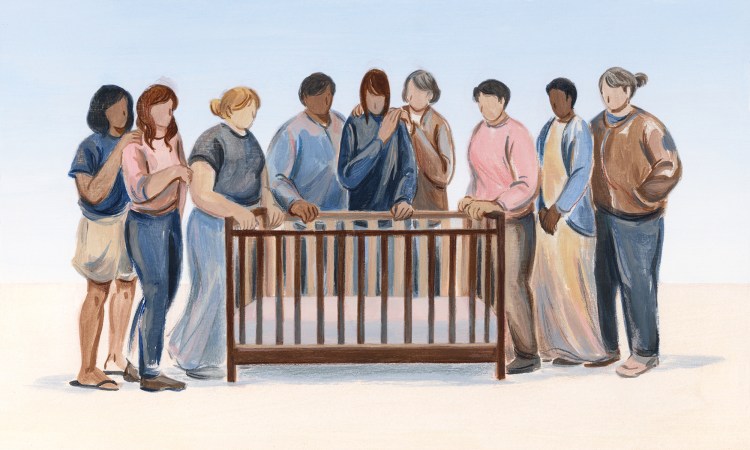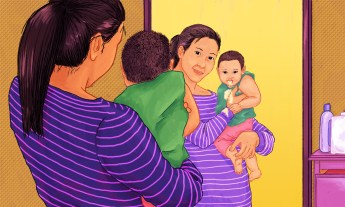
At the tender age of five, I knew exactly what I wanted to do when I grew up. While my kindergarten classmates aspired to become firefighters and astronauts, I dreamed of becoming a teacher and a mother.
In 2011, I married my long-term partner John and became the stepmother of a vivacious 10-year-old named Lexi. That same year I launched my career as a tenure-track professor, and my dream of becoming a teacher became a reality. But John, Lexi, and I dared to dream a little bit more — we wanted to add a baby to our family.
Four years later, we were ecstatic to discover I was pregnant. We brainstormed baby names, designed the nursery, and counted down the days until we could hold our newborn (whom we affectionately nicknamed Baby Spud) in our arms. I experienced the typical first-trimester pregnancy symptoms: morning sickness, food cravings and fatigue, and it was all worth it when John and I got to hear Baby Spud’s heartbeat and see her wiggle and dance on the sonogram screen.
It was one of the most exhilarating moments of our lives.
Unfortunately, that was the first and last time we got to meet Baby Spud. During my 12th week of pregnancy, I returned to my OB-GYN’s office for a routine examination. The healthcare provider had difficulty hearing Baby Spud’s heartbeat, so she sent me down the hallway for additional screening. Less than one minute into the ultrasound, the sonographer’s face fell, and she delivered the bad news, “We’ve lost the baby.”
I felt immense grief, anger and shame. I felt betrayed by my body.
I later learned that I had experienced a silent miscarriage. This occurs when the fetus fails to thrive, but the body tricks itself into thinking it’s still pregnant. Baby Spud had died in my womb around 9 or 10-weeks’ gestation, and yet I continued to experience the hallmark symptoms of a healthy pregnancy.
I was shocked. I felt immense grief, anger and shame. I felt betrayed by my body for failing to nurture and keep Baby Spud alive, and I felt ill equipped to deal with the physical pangs, immense uncertainty and emotional toll of pregnancy loss.
But then something remarkable happened. When I began to share my story with family, friends, and colleagues, it emerged that they, too, had experienced pregnancy loss. It was like there was an invisible community of people who had been affected by this, and we were all suffering in silence. That was when I realized I was not alone. More importantly, we could cope together.
Pregnancy loss remains shrouded in silence and stigma. This societal silence is problematic, because it forces people to cope alone.
Each year, pregnancy loss impacts millions of people. The Mayo Clinic estimates that miscarriages occur in 10 percent to 20 percent of known pregnancies, and the World Health Organization reports that approximately 2.6 million stillbirths occur annually around the globe.
Although several prominent women have shared their stories publicly — including Chrissy Teigen, Meghan Markle, Carrie Underwood and Beyonce Knowles-Carter — pregnancy loss remains largely shrouded in silence and stigma. This silence is a problem, because it forces people to cope alone and prevents meaningful public awareness of and support for those who’ve experienced pregnancy loss.
Two questions keep me awake at night:
- Why do silence and stigma persist around pregnancy loss?
- What can we do to shatter this silence?
Pregnancy loss can be understood as a complicated constellation of taboo and triggering topics including death, illness, pain, trauma, gynecological health, privacy management, grief and uncertainty.
When people experience a miscarriage or stillbirth, many times they ask themselves the question: “Why? Why me, why now, and why did this happen?”
Often, the answers are insufficient and anything but satisfying. To better understand these experiences, I have been working on a study in which I conducted 25 in-depth interviews with women between the ages of 18 and 74 — all of whom have experienced at least one miscarriage during their life.
Collectively, they’ve revealed the core challenges that many people experience while coping with miscarriage, which include difficulty disclosing their loss to others, insufficient and insensitive social support, ineffective communication with healthcare providers and overwhelming uncertainty.
In the US, there aren’t many mainstream cultural rituals to help people bereaved by pregnancy losses; individuals often grieve privately instead.
While processing their grief, many of these women tried to understand the underlying causes of their pregnancy loss. Unfortunately, there’s often no answer at all — no medical explanation, no accident, nothing. For many of my study’s participants, the lack of a definite cause produced heightened feelings of uncertainty and anxiety.
If there were no clear reasons for the miscarriage, what could be done to prevent future pregnancy losses?
In the US, there aren’t many mainstream cultural rituals to help people bereaved by pregnancy losses; individuals often grieve privately instead. Despite the likelihood that multiple people in our social networks have experienced one or more miscarriages or stillbirths, many of us are unprepared to participate in these crucial conversations.
Some friends and family try to put a positive spin on the situation. They say “Well, at least you can get pregnant” or “You’re still young” or “Look on the bright side — you’re lucky because you already gave birth to a healthy child a few years ago.” While well-intentioned, these messages fail to acknowledge the person’s unique loss and do not provide a space for them to process their emotions and talk openly about their experiences.
Another common mistake occurs when friends and family rush to conclusions and try to offer advice like “Maybe you shouldn’t have had that extra cup of coffee” or “You should have quit your stressful job” or “The next time you get pregnant, you should exercise more.” These messages are particularly problematic, because they suggest the pregnant person may have been partly responsible. In reality, the Cleveland Clinic estimates that the underlying causes of one-third of stillbirths are unknown and half of first-trimester miscarriages are caused by chromosomal abnormalities, most of which occur by chance.
When I was grieving the loss of Baby Spud, I received a really mixed bag of responses. The hurtful ones often lingered with me the longest. One person even flippantly said, “It’s been a month — just get over it”, and another told me to simply move on with my life. These messages further drive home why so many of us are reticent to talk about our losses.
Nonetheless, there is power in speaking out. In doing so, we can help other people grieve. We can dispel pregnancy myths, better support each other and create new ways to cope together.
So, how can we shatter the silence? It might feel like the odds are stacked against us, but there are many actions that we can take to tackle the stigma around miscarriage and stillbirth.
1. Share your story
People can break the silence by sharing their own pregnancy loss stories and journeys in safe spaces. From local support groups, online communities and special social media groups to one-on-one conversations with friends or family members, you can tell your truth and help others know they’re not the only ones who have been affected.
2. Provide helpful support to the bereaved
If someone discloses to you that they’ve experienced a pregnancy loss, you can create a supportive, non-judgmental space for them to speak and process their bereavement. Take the time to listen to them, and avoid saying well-intentioned — yet hurtful — things like “At least you didn’t …” or “Maybe you shouldn’t have …”
Instead, acknowledge the person’s loss, validate their feelings and simply hear them out. Ask how they’re feeling and affirm your commitment to supporting them — for ex., saying “I am here for you.”
Consider offering other forms of support, such as comfort food, a special keepsake or a donation in honor of their loved one. Given the personal and vulnerable nature of pregnancy loss, honor their privacy by receiving their permission before you share their stories with others. And remember that the coping process takes time and that grief can reemerge throughout the year — whether it’s on Mother’s Day, their due date or the anniversary of their miscarriage or stillbirth.
3. Help raise awareness
We can destigmatize pregnancy loss through outreach, education and candid communication. In addition to participating in Pregnancy and Infant Loss Awareness Month in October, we should continue having conversations about it throughout the year.
My pregnancy loss experience was a defining moment — but it is not the only thing that defines me. In 2015, I thought my story was over when we lost Baby Spud, but time went on and my story continued.
Two years later, John, Lexi and I were thrilled to welcome baby Sean to our family.
Over three decades have passed since I proudly proclaimed that my lifelong dream was to become a teacher and a mother. I now have a new dream, which is to work diligently and tirelessly to shatter the silence on pregnancy loss, and I invite you to come on this journey with me.
—————————–
This article was adapted from Dr. Lisa Hanasono‘s TEDxBGSU talk. Watch it here:














